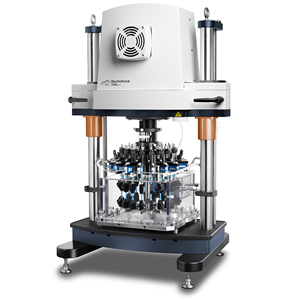View Multi-Specimen Fatigue Brochure Request a Quote
Durability testing can take a long time, especially when the material or product is expected to last for many years and a high number of cycles. Multi-specimen fatigue shortens durability test time by simultaneously applying cyclic displacement to many samples and detecting each sample’s cycles-to-failure for the applied loading level. This allows users to generate many failure datapoints for each loading level. When multiple tests are run on similar samples, researchers can quickly build SN curves (S-n Curves) with many data points to improve statistical confidence levels of the resulting fatigue model. Otherwise, these millions, 10s of millions and even 100s of million cycle-long tests can extend product development time and hinder efforts to accelerate time to market of new materials and products.
Multi-specimen fatigue instruments use a dynamic linear motor and have the capacity to secure many samples into a test fixture and effectively share the loading from that motor. This approach applies a common displacement amplitude to all samples, often using a high frequency sinusoidal loading profile to accelerate the fatigue loading on the many samples. Each specimen has a force sensor to track the applied force; this sensor measures the degradation and/or failure point (number of cycles to failure) for that sample.
The TA Instruments’ MSF instruments leverage the premier high frequency and high durability electrodynamic linear motors of the ElectroForce 3330 Load Frame. This motor design offers a unique combination of best-in-class accelerated fatigue frequencies to deliver more data faster, coupled with premier reliability backed by a 10-year warranty. The MSF16 configuration is particularly well-suited for testing in 37 °C fluid environments for medical device durability studies such as stent wire fatigue. The MSF6 configuration is compatible with an oven to deliver high-throughput fatigue results in temperatures between -20 to 150 °C, and therefore useful for a wide range of material studies such as polymer and elastomer fatigue. Both MSF configurations deliver quicker insights on material fatigue and help more durable products reach their markets faster.
Common Testing Standards
- ASTM D4482 – Rubber testing: Test Method for Rubber Property – Extension Cycling Fatigue
- ASTM F2606 – Stent testing: Standard Guide for Three-Point Bending of Balloon Expandable Vascular Stents and Stent Systems
- ASTM F2942 – Stent testing: Standard Guide for in vitro Axial, Bending, and Torsional Durability Testing of Vascular Stents
- ASTM F3211 – Standard Guide for Fatigue-to-Fracture (FtF) Methodology for Cardiovascular Medical Devices
ElectroForce Multi-Specimen Fatigue Instruments
Application Notes
- Coming soon!


